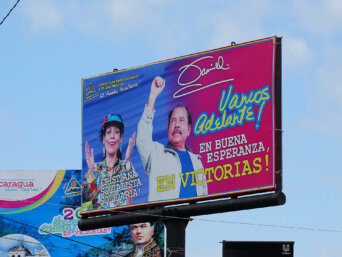- About
- Topics
- Picks
- Audio
- Story
- In-Depth
- Opinion
- News
- Donate
- Signup for our newsletterOur Editors' Best Picks.Send
Read, Debate: Engage.
| topic: | Democracy |
|---|---|
| editor: | Ellen Nemitz |
In November 2021, presidential elections will take place in Nicaragua. However, there is a strong fear that Daniel Ortega’s dictatorship could be sustained as the National Assembly, under his influence, is passing several laws considered anti-democratic.
After 14 uninterrupted years in power (Ortega was also the leader of Nicaragua between 1979 and 1990, and won the elections democratically in 1984 after the Nicaraguan Revolution overthrew the dictator Anastasio Somoza), Ortega is now considered by some people as bad as, or even worse than, Somoza himself.
According to the "Law for the Defense of the Rights of the People to Independence, Sovereignty and Self-Determination for Peace”, approved in December 2020, opposing politicians were banned from the upcoming election. The leader of Sandinistas deputies, Edwin Castro, threatened to jail those who try to disrespect it. The ruling is being hardly condemned by national and international organizations, such as the European Union in Nicaragua and the Organization of American States (OAS).
“The OAS General Secretariat calls on the government to repeal the law in question, and reiterates its call to begin a process with the various political and social actors in the country, to undertake the necessary electoral reforms that guarantee free fair and transparent elections,” the organisation said in a press release in December 2020.
Furthermore, earlier last year Ortega’s administration ruled what is known as “Gag Law”. In fact, specialists affirm that the Law for the Regulation of Foreign Agents and the Special Law on Cyber-Crime aim to even further reduce freedom of expression and restrict journalism work by harassment and violence.
“The new legislation was presented by the ruling party days after the president expressed interest in initiating a reform to establish life imprisonment, which could be used to punish those who raise their voices against repressive policies,” said the Americas director at Amnesty International, Erika Guevara-Rosas.
In 2018, the country witnessed a series of protests sparked by a social security system reform, following which El Pais published an opinion article called “Ortega’s dictatorship”, pointing out the intensification of “the assault on society to overturn any criticism.” “Daniel Ortega’s government behaves like a corrupt, autocratic regime that cares less about well-being and the freedom of the citizens of Nicaragua than its own power,” it read.
Also that year, some of The Guardian’s readers argued about the protests, disagreeing whether they were peaceful or not and whether demonstrators’ reasons were valid. "The barricade-builders have certainly been guilty of atrocities, although far fewer than the regime,” said Dr Jon Cloke. "But meanwhile, regime corruption continues unabated, democracy is a joke, and the blood of murdered youth runs in the streets.”
In 2021, the Central American country will try to rewrite its history and its future. In order to guarantee a fair election, it is essential to fight abstention and to open the candidacy possibility to opposing politicians, according to local media. “2021 is an opportunity, maybe the last one, to give life and future to this nation, that is about to celebrate 200 years of independence,” assesses journalist Juan Daniel Treminio.
Image by Daniel.

